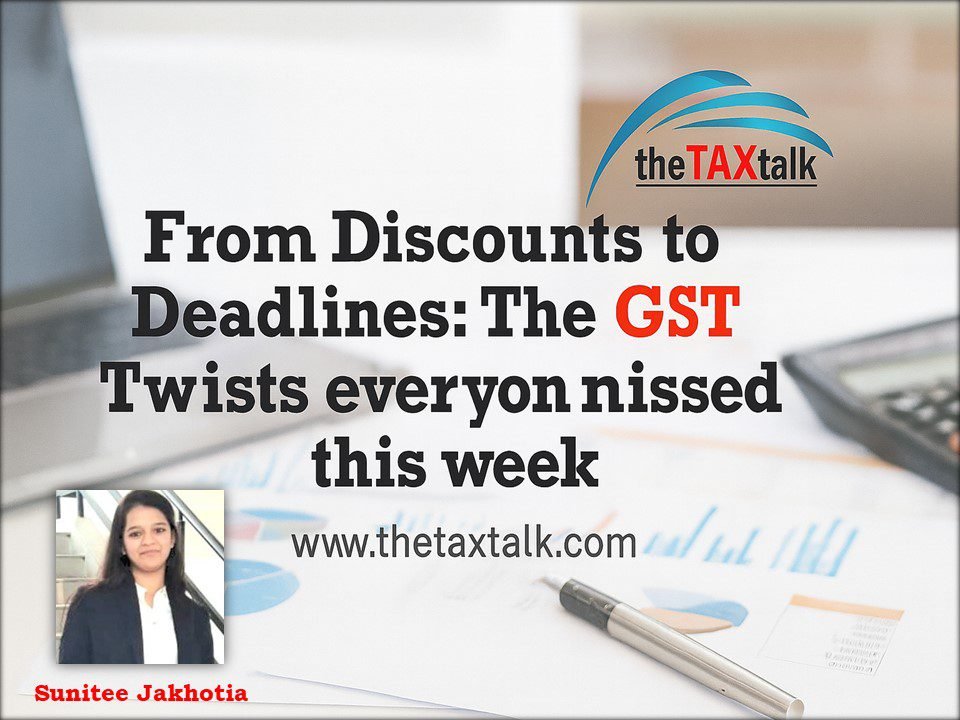![]()
From Discounts to Deadlines: The GST Twists everyone missed this week
Every week the world of GST brings a mix of deadlines, clarifications, and courtroom battles. Sometimes, it feels like a running series with new plot twists. So, Let us start with dissecting this new hot updates. Here’s what unfolded this week:
1. Filing GST Returns Beyond 3 Years: The Clock Is Ticking
Imagine a taxpayer who always procrastinates – let’s call him Mr. Sharma. He thinks, “GST returns pending since 2022? Arrey, I’ll manage them someday.”
But come October 1, 2025, GSTN will slam the door shut. No return older than three years from its due date will be allowed to be filed. For example, GSTR-1 or 3B for August 2022 must be filed by September 30, 2025 – after that, the window is gone forever.
The moral? Don’t be Mr. Sharma. File your old returns before GSTN files them in history.
Legal Summary: GSTN has formally announced that effective October 1, 2025, filing of GST returns beyond three years from their statutory due date shall be barred. This includes all major returns such as GSTR-1, 3B, 4, 9, 9C, and 6. The measure enforces statutory limitation periods and prevents perpetual pendency of returns.
2. Post-Supply Discounts: A Game of Agreements
Picture a dealer who receives a big festive “discount” from a manufacturer. If it’s simply a credit note – no strings attached – life is easy: no ITC reversal needed.
But let’s say the manufacturer whispers, “Beta, give this discount to the end customer at a reduced price, as per our agreement.” Suddenly, that amount turns taxable for the dealer.
And if the dealer agrees to do extra promotional activities for the manufacturer in exchange for money, it’s not just pocket money – it’s taxable income. Without a written agreement, though, it remains just a discount.
Legal Summary: The GST circular clarifies that ITC reversal is not required where discounts are passed by way of financial credit notes. However, if discounts are tied to specific agreements with end customers, or if dealers undertake promotional activities under written contracts with manufacturers, the consideration so received shall be taxable in the dealer’s hands. Absent such agreements, the amounts remain in the nature of discounts.
3. Refund Notices Quashed: Exporters Breathe Easy
Exporters have long felt like they’re stuck in a never-ending soap opera. SCNs kept landing on their desks because of the infamous Rules 89(4B) and 96(10).
Then came the twist: the Bombay High Court (in Hikal Ltd.’s case) said that since these rules were repealed without a saving clause, they’re deemed never to have existed. In other words, it’s like a villain being written out of the script – retroactively.
For exporters, this judgment is more than just relief. It’s the end of a storyline that dragged on for years.
Legal Summary: The Bombay High Court held that proceedings under repealed Rules 89(4B) and 96(10) cannot survive absent a saving clause. Consequently, all pending SCNs relying on these rules lapse, as the provisions are deemed to have never existed. This ruling provides significant relief to exporters and ends longstanding disputes.
4. ITC Distribution: One Door Policy
Companies with multiple branches have often played musical chairs with ITC – transferring it from one registration to another, then distributing it further.
But the Tamil Nadu AAR (in MRF Ltd.’s case) made it clear: the game is over. ITC must now be distributed strictly through the Input Service Distributor mechanism.
Think of it like entering a movie hall. Earlier, you could sneak in from the side gate. Now, the rules say – everyone enters only through the main gate, no shortcuts.
Legal Summary: The Tamil Nadu AAR ruled that transferring ITC from regular GST registrations to ISD for distribution is no longer valid post-amendment. Distribution of common input service credit must strictly follow the amended ISD mechanism, marking a significant compliance shift for multi-state entities.
5. Post-CIRP Tax Demands: The Clean Slate Principle
The Gujarat High Court (Sintex-BAPL Ltd.) reaffirmed one of the most powerful lines in corporate law: once a Resolution Plan under IBC is approved, old tax demands vanish.
It’s like a company pressing the reset button in a video game. Whatever monsters (legacy tax demands) were chasing you no longer exist in the new level.
This ensures that resolution applicants are not discouraged by ghosts of past liabilities and can focus on building afresh.
Legal Summary: The Gujarat High Court held that tax demands raised post-CIRP approval are invalid. Once a Resolution Plan is sanctioned under the Insolvency and Bankruptcy Code, all prior claims including tax liabilities not incorporated in the plan stand extinguished. The judgment reinforces the clean slate principle, shielding resolution applicants from legacy liabilities.
Final Word for my dear readers:
GST updates may sound like rules on paper, but they’re really stories about deadlines missed, agreements tested, exporters rescued, and companies reborn. If there’s one lesson this week, it’s this: in GST, timing and paperwork decide whether you’re the hero of the story – or stuck as the cautionary tale.
I would like to hear your opinion/ suggestions/ feedback on these latest article. Please feel free to write me at suniteejakhotia@gmail.com


